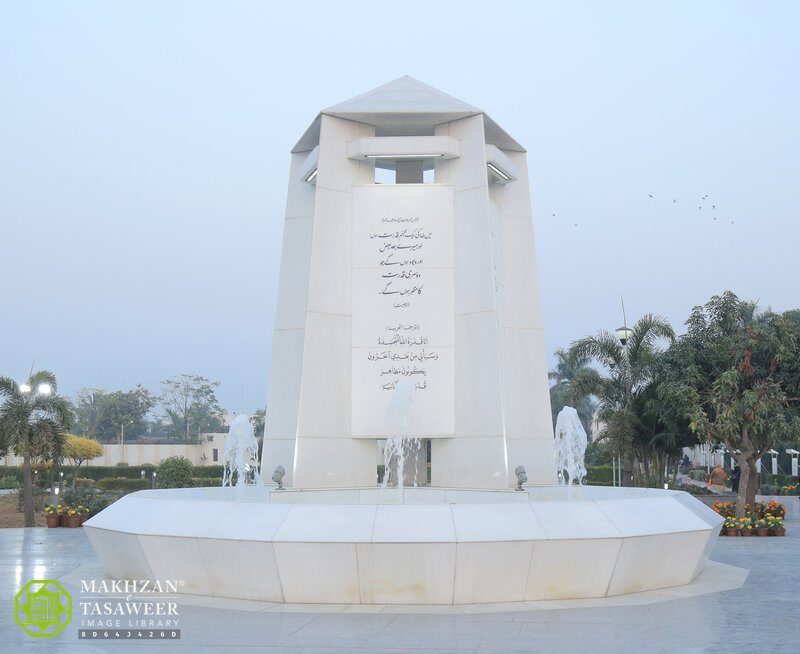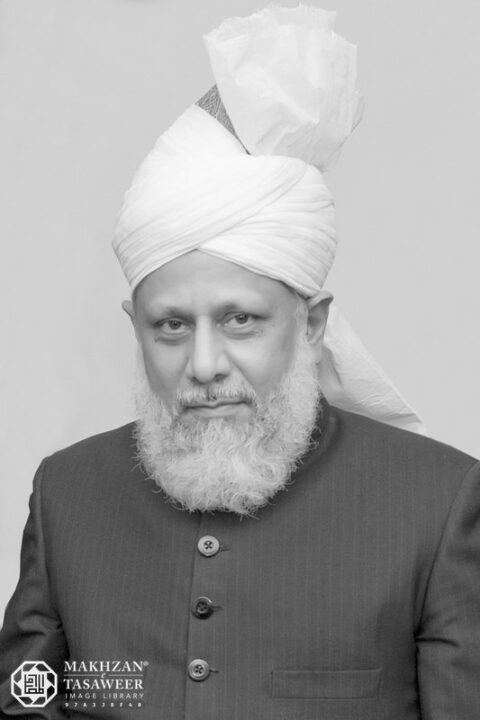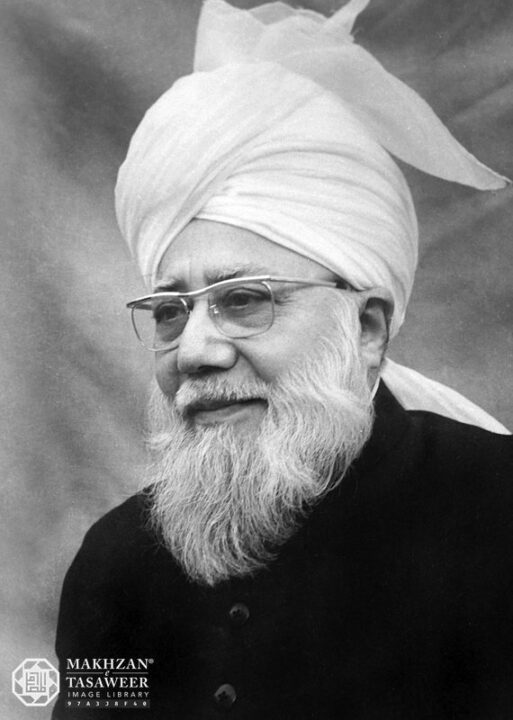Jazib Mehmood, Student Jamia Ahmadiyya International Ghana

“I am the Khalifatul Masih, as were my predecessors […] and so just as they followed the Promised Messiahas in all matters and sought to fulfil his mission, so do I. Every Khalifa follows the guidance of Hazrat Mirza Ghulam Ahmadas of Qadian because we are his successors.
“[…] When I took the bai‘at of the Khulafa who preceded me, it meant that I had sold myself. Bai’at literally means in Arabic to ‘sell yourself’ and when you sell yourself it means that you no longer control your own destiny and that your life is in the hands of someone else. Thus, my relationship with the Khulafa who preceded me was exactly like this, that I listened to and obeyed them in every matter.” (Abid Khan, London Diary – Spring 2018, pp. 22–23)
These are the words of the current worldwide head of the Ahmadiyya Muslim Community, Hazrat Mirza Masroor Ahmad, Khalifatul Masih Vaa. They describe in perfect terms not just the meaning of Khilafat and the level of obedience it demands of us, but also call us to witness the magnificent examples of reverence, obedience and love that each Khalifa has had for their predecessor.
In this article, we will observe some personal examples from each of the Khulafa-e-Ahmadiyyat which should leave no doubt that where they ask the Jamaat for complete obedience, they also practise it to perfection before wearing the mantle of Khilafat.
Hazrat Khalifatul Masih Vaa

Huzooraa presented an example of this obedience on one occasion:
“When I was a student, the situation for Ahmadi Muslims in Pakistan became increasingly fraught and dangerous. As a result, some people very close to me suggested that I should not go back to university because it was too dangerous. Yet at that time, Hazrat Khalifatul Masih IIIrh told me not to be scared and instructed me to go and attend the classes.
“Hence, perhaps the first great lesson he personally gave me was to instil courage and bravery in me. Where others were telling me that I would be beaten and mercilessly attacked if I went to university, my Khalifa told me to disregard any fear and to not let the conditions cower me and stop me from attending my classes.” (Abid Khan, London Diary – Spring 2018, p. 24)
Speaking of his relationship with Hazrat Khalifatul Masih IVrh, Huzooraa states:
“Of course, there was a close familial relationship between us, as he was my uncle and I had grown up with him and had a close personal relationship with him from before his Khilafat. In fact, to some degree, there was frankness between us, but as soon as he was elected as Khalifatul Masih our relationship changed. It was as though a barrier had appeared, whereby the frankness from my side was converted into a complete and utter respect for him as my spiritual leader.” (Abid Khan, London Diary – Spring 2018, p. 25)
He further stated: “In fact, in my heart, I was determined to be his most obedient follower and vowed that no matter what, I would listen and obey everything that he desired from me. I was determined that, more than anyone else, I would be the one who would honour and obey him at all times. (Ibid.)
His reverence for the station of Khilafat as well is best explained in Huzoor’s own words:
“When I was Nazir-e-A‘la in Rabwah, a person said to me that there were only two busy people in the world and that one was Khalifatul Masih IVrh and the other was me. I very rarely raised my voice, but on that occasion, I did raise my voice purposely so that even the people around me could hear. I said to him, that how dare you insult my Khalifa by comparing him to me?” (Abid Khan, A Personal Account – October-November 2016 Part 4, p. 65)
Hazrat Khalifatul Masih IVrh

Once, Hazrat Khalifatul Masih IIIrh assigned Hazrat Mirza Tahir Ahmadrh a responsibility and asked him to go to East Bengal (present-day Bangladesh). Hazrat Mirza Tahir Ahmadrh narrates that:
“In the days when there was a lot of chaos in Bangladesh (at that time it was called East Bengal), I was in Karachi. Hazrat Khalifatul-Masih IIIra gave me the responsibility of completing a task and told me to leave for it right away.
“When I checked [flights] for a seat, they were all booked. All the related individuals said that there was no question of a seat [being available] because twenty passengers were waiting. Therefore, even if a seat became available, they would give it to them first [and] there was no chance of me going.
“I said, ‘Whether anyone else goes or not, I will definitely go because I have been given an order.’ Hence, I went to the airport. There was a queue of people. The passengers were waiting and a little while later all the people were told that the aeroplane had taken off.
“After this announcement, everyone left. There was no one left there who could be given a chance to go, but I remained standing there. I was certain that it would be impossible that I did not go.
“Suddenly, a voice came from the desk, saying, ‘There is room for one passenger. Is there anyone who has a ticket?’ I said, ‘I have a ticket’; they said, ‘Run, the aeroplane is waiting for one passenger.’” (Al Fazl Rabwah, 25 September 1998)
Once, he stated:
“I held a servant-like love for [my] dear brother.” (Hazrat Mirza Nasir Ahmadrh by Hazrat Syeda Tahir Sadiqa Nasir, p. 166)
His reverence and regard for the words of the Khalifa was demonstrated when he became Sadr Majlis Ansarullah in 1979; his first plan of action was to improve the system of preparing the cassettes of the Friday sermons of the Khalifa. For this, he ordered duplicators from Europe and streamlined the entire process so that copies could be made faster and distributed not just across the country, but across the world. This became instrumental when he became Khalifa and migrated to London. (Al Fazl Rabwah, 27 December 2003, p. 25)
Once, it so happened that Hazrat Khalifatul Masih IIIrh sent for him urgently. The moment he received the message – despite the fact that he was wearing slippers – he rushed to meet the Khalifa. (Al Fazl Rabwah, 6 June 2003, p. 3)
Hazrat Khalifatul Masih IIIrh

Once, while Sahibzada Mirza Nasir Ahmadrh had yet to wear the mantle of Khilafat, he was working in Khuddamul Ahmadiyya. Out of some misunderstanding, one of Hazrat Musleh-e-Maud’sra wives complained to Hazrat Musleh-e-Maudra about him.
Hazrat Musleh-e-Maudra was extremely displeased and scolded Sahibzada Mirza Nasir Ahmadrh. However, despite the fact that it was no fault of his, he remained silent and refused to deny the complaint made against him. He himself stated that he did so purely out of love for Hazrat Musleh-e-Maudra and could not bear to displease him further. (Hazrat Mirza Nasir Ahmadrh by Hazrat Syeda Tahir Sadiqa Nasir, p. 166)
Hazrat Musleh-e-Maud’s passing was hard on him. Once, in a sad tone, he stated to his wife: “During the lifetime of Hazrat Musleh-e-Maudra, I considered it a sin to even consider his passing.” (Hazrat Mirza Nasir Ahmadrh by Hazrat Syeda Tahir Sadiqa Nasir, p. 165)
Hazrat Khalifatul Masih IIra

Hazrat Maulvi Sher Alira states that:
“During the time of the first Khilafat, I observed that the example of respect, reverence, obedience and submission that he [i.e., Hazrat Sahibzada Mirza Bashir-ud-Deen Mahmood Ahmadra] had for Hazrat Khalifatul Masih Ira was not found in any other person. His level of respect was such that whenever he would go in his presence, he would sit with folded legs and put his hands on his knees. He would sit like this for however long he would be in his presence. I have never seen this in any other person. Similarly, he would completely obey Hazrat Khalifatul Masih Ira in every matter.”
His level of obedience was such that Hazrat Khalifatul Masih Ira also acknowledged it in a speech in 1912. He stated that Sahibzada Mirza Bashir-ud-Deen Mahmood Ahmadra obeyed him to such a degree that no one in the Jamaat could match it. (Tarikh-e-Ahmadiyyat, Vol. 3, p. 605)
Their closeness was such that Hazrat Musleh-e-Maudra once stated:
“Forty-two years have passed since the demise of Hazrat Khalifatul Masih Ira. However, I still sacrifice [an animal] on his behalf whenever it is the occasion to offer qurbani. […] Later, when I went on Hajj, I offered qurbani on his behalf on that occasion too and I have continued to offer qurbani on his behalf on the occasion of every Eid till today.” (Majlis Ansarullah Markaziyyah ke Doosray Salana Ijtema mein Khitabat, Anwar-ul-Ulum, Vol. 25, p. 468)
Hazrat Khalifatul Masih Ira

The mutual love that existed between Hazrat Khalifatul Masih Ira and the Promised Messiahas is quite well-known in the literature of the Jamaat. There are many incidents that shine a light on his reverence for the Promised Messiahas.
Hazrat Mirza Bashir Ahmadra states that once, when his younger brother, Mubarak Ahmad, was ill, the Promised Messiahas asked Hazrat Hakeem Noor-ud-Deenra to check on him.
At the time, the Promised Messiahas was seated in the courtyard on a charpoy. There was no other place to sit. But when Hazrat Maulvira entered, he immediately sat on the floor by the charpoy out of respect.
The Promised Messiahas said, “Maulvi Sahib, sit on the charpoy.” Hazrat Hakeem Noor-ud-Dinra replied, “Huzoor, I am seated”, he straightened and put his hands on the charpoy. When the Promised Messiahas asked again, he obliged but sat at the very corner of the charpoy.
Hazrat Mirza Bashir Ahmadra, commenting on this incident, remarks that, “The spirit of obedience and respect in Maulvi Sahib was of the highest degree.” (Seerat-ul-Mahdi, Vol. 1, p. 57, narration no. 78)
Once, it so happened that a Hindu from Batala took Hazrat Khalifatul Masih Ira with the permission of the Promised Messiahas for the treatment of his wife. The Promised Messiahas, while giving permission, said, “I hope that you will be back by the evening.”
With this in mind, Hazrat Hakeem Noor-ud-Deenra reached Batala by the evening. He saw the patient, prescribed the medicine and took the same yakka (a two-wheel small carriage drawn by a horse) for the return trip. The road was very bad; it was wholly muddy and the yakka could not move further. Instead of giving up, he left the yakka and started walking on foot.
He was barefoot; his feet were wounded by thorns, but he kept walking and returned to Qadian by midnight. He met with the Promised Messiahas at the Fajr prayer and told him that he was back in the night, never mentioning what had happened to him. (Hakeem Noor-ud-Deen by Syed Hasanat Ahmad, pp. 173–174)
Testifying to this love that Hazrat Khalifatul Masih Ira had for the Promised Messiahas, Hazrat Musleh-e-Maudra once spoke about his condition after the passing of the Promised Messiahas. He states:
“Those who are familiar with the high resolve of Hazrat Khalifatul Masih Ira will know just how strong he was; he would never let his grief and worries show. However, when he was alone and no one else was around, he would often remark to me, that: ‘Mian! Ever since Hazrat Sahib[as] passed away, my body feels hollow, and the world feels empty. I walk amongst people and work too, but I still feel as though nothing remains in this world.’” (Friday Sermon 14 April 1926; Khutbat-e-Mahmood, Vol. 1, pp. 144–145)
May Allah enable us to make our best efforts to uphold these outstanding examples of obedience and love for Khilafat. Amin.

